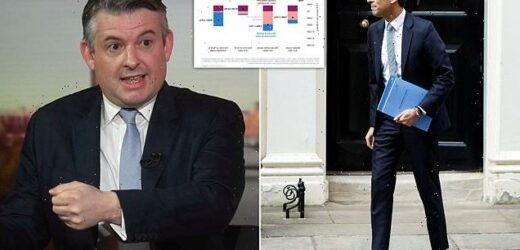State pension ‘faces biggest real-terms cut in half a century’ with value down £427 this year as Labour brands Rishi Sunak ‘Mr Tax’ after mini-Budget
- Labour has accused Rishi Sunak of biggest state pension cut in half a century
- Payouts are due to rise 3.1 per cent this year but inflation is running far higher
- Chancellor has been branded ‘Mr Tax’ amid backlash at his Spring Statement
Rishi Sunak was branded ‘Mr Tax’ today as he was accused of overseeing the biggest real-terms fall in the state pension for half a century
Rishi Sunak was branded ‘Mr Tax’ today as he was accused of overseeing the biggest real-terms fall in the state pension for half a century.
Labour analysis suggested the decision to downgrade the ‘triple lock’ amid soaring inflation will mean a £427 hit this year.
The policy has ensured that the payouts rise each year in line with whichever is highest out of CPI, average earnings, or 2.5 per cent.
However, the policy was suspended for 2022/23 after wage growth spiked as the country emerged from the pandemic. As a result the state pension will only go up 3.1 per cent next month.
In contrast, inflation is expected to average just under 8 per cent.
Shadow work and pensions secretary Jonathan Ashworth said the Chancellor had ‘room for manoeuvre’ in his mini-Budget last week, and derided his claims to be cutting taxes.
The Treasury is already thought to be putting together another cost-of-living bailout after Mr Sunak’s personal ratings slumped to a record low in the wake of the Spring Statement.
He was accused of being an ‘illusionist’ last week as he hailed his ‘tax-cutting’ Spring Statement, despite the burden being on course to reach the highest level since the 1940s.
The government’s own watchdog has predicted that this year will see the biggest fall in disposable incomes since records began in the 1950s.
Mr Ashworth told Ridge On Sunday on Sky News: ‘Rishi Sunak absolutely had more room for manoeuvre in this spring statement and mini budget, but rather than acting in the interests of the British people, he was playing games.
‘He was acting in his own interest because he thinks by offering an income tax cut in two years that’ll help him politically with Conservative MPs if there’s a leadership contest or that’ll fit the Tory election grid.
‘I don’t believe that putting 1.3million people into poverty because you’re imposing a very severe real-terms cut to universal credit, you’re imposing the biggest cut to the pension in 50 years, is fair.’
Shadow work and pensions secretary Jonathan Ashworth said the Chancellor had ‘room for manoeuvre’ in his mini-Budget last week, and derided his claims to be cutting taxes
The inflation rate is expected to average nearly 8 per cent over the coming year, but benefits will only be uprated by 3.1 per cent in April as the mechanism used is retrospective.
Mr Ashworth said Mr Sunak should have imposed a ‘windfall tax’ on the profits of oil and gas companies to generate funds to help struggling families and pensioners with energy bills.
He said: ‘He chose not to do that.
‘Instead, he’s imposed these very punishing tax rises, these very severe real-terms cuts to the pension and support like universal credit, and he’s expecting people to be grateful because two years down the road he’s saying there’s going to be an income tax cut even though that income tax cut nowhere near offsets the 15 tax rises that he has imposed on the British people, £3,000 extra per household if you do a rough and ready calculation.
‘He is a tax-rising Chancellor, he is Mr Tax and it’s the British people who are paying the price.’
An Opinium poll found Mr Sunak, once among the most popular members of the government, has seen his ratings tumble into negative territory for the first time.
Research carried out after the mini-Budget showed 35 per cent disapprove of his performances, compared to 31 per cent who approved.
The net figure of minus four was a drop of 15 points from a fortnight ago, and compares to Mr Sunak’s previous low of plus seven in October last year.
The political toxicity of the cost-of-living crisis was underlined last week in a presentation by Tory election strategist Michael Brooks to No10 staff.
It suggested the issue had ‘shot up’ and overtaken the NHS as the most important issue.
‘The cost-of-living issue is a train about to hit us,’ a source told the Sunday Times.
In February Mr Sunak gave a rebate of £150 to those living in properties in council tax bands A to D, and a £200 reprieve on energy bills, to be paid back over five years.
Writing in the Sun on Sunday, Mr Sunak said: ‘I know people are deeply anxious about making ends meet.
‘While we can’t completely shield everyone from the global challenges we face, we can, and will, help you deal with these rising costs.’
He added: ‘I cannot pretend that we can completely protect people from the difficult and uncertain times ahead.
‘But this government will continue to stand by your side and do all that we can to support you.’
One former Tory Cabinet Minister told the Mail on Sunday that Mr Sunak’s ‘political stock has fallen hugely’ and suggested Mr Johnson should consider moving him in a future reshuffle.
The respected IFS think-tank has highlighted the huge hit to people’s finances as the Chancellor tries to balance the books after Covid
The ex-Minister also called on the Chancellor to reverse the controversial rise in National Insurance.
He also said Mr Sunak’s promise of a future cut in the basic rate of income tax by 2024 was too transparently ‘political’, adding: ‘It almost made him look shifty.’
However, some ‘Red Wall’ Tories sprang to Mr Sunak’s defence yesterday. Leigh MP James Grundy said: ‘For people at the sharp end in Red Wall seats, the Chancellor has delivered a remarkable amount given the limited leeway he had.’
He said the decision to raise the NI threshold by £3,000 and other measures would deliver an extra £1,600 a year to a single person on the minimum wage with two children.
He added: ‘That will make a massive difference for those who struggle to make ends meet.’
Source: Read Full Article





